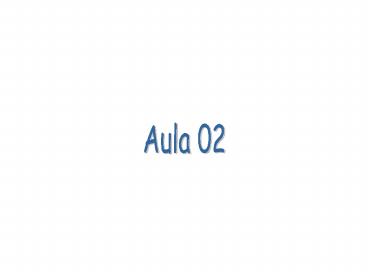Apresenta PowerPoint PPT Presentation
Title: Apresenta
1
Aula 02
2
(No Transcript)
3
Bravais Lattice
FIGURE A general two-dimensional Bravais lattice
of no particular symmetry the oblique net.
Primitive vectors a1 and a2 are shown. All points
in the net are linear combinations of these with
integral coefficients for example, P a1 a2,
and Q -a1 a2. (Ashcroft, Neil W. Solid state
physics.)
4
FIGURE A simple cubic three-dimensional Bravais
lattice. The three primitive vectors can be taken
to be mutually perpendicular, and with a common
magnitude. (Ashcroft, Neil W. Solid state
physics.)
5
Honeycomb
FIGURE The vertices of a two-dimensional
honeycomb do not form a Bravais lattice. The
array of points has the same appearance whether
viewed from point P or point Q. However, the view
from point R is rotated through 1800. (Ashcroft,
Neil W. Solid state physics.)
6
Graphite
7
(No Transcript)
8
Graphite layer
Tube (4,3)
a1,a2 unit vectors in hexagonal lattice
9
(No Transcript)
10
Dream Atom by Atom Engineering
- Efeitos quânticos - (?e?Lsistema)
- confinamento, transporte quantizado, ...
- Efeitos de superfície/interface serão
fundamentais - catálise, propriedades fundamentais (dureza)
11
Há muito espaço lá embaixo
- Uma esfera de ferro, de um kilograma de massa,
possui um raio de cerca de 31 milímetros. - A mesma massa de Fe pode ser distribuída em
trinta mil esferas de 1 mm de raio, com uma
superfície total de 0,38 m2. - Ou ainda, em trinta mil bilhões de esferas de 1
mm de raio, com uma superfície total de 380 m2. - Ou ainda, em trinta mil bilhões de bilhões de
esferas de 1 nm de raio, com uma superfície total
de 380.000 m2.
12
FIGURE Several possible choices of pairs of
primitive vectors for a two-dimensional Bravais
lattice. They are drawn, for clarity, from
different origins. (Ashcroft, Neil W. Solid state
physics.)
13
Body-centered cubic Bravais lattice
Primitive vectors
FIGURE Three primitive vectors, specified in Eq.
(4.3), for the body-centered cubic Bravais
lattice. The lattice is formed by taking all
linear combinations of the primitive vectors with
integral coefficients. The point P, for example,
is P - a1 - a2 2a3 . (Ashcroft, Neil W. Solid
state physics.)
14
Body-centered cubic Bravais lattice
Primitive vectors
FIGURE A more symmetric set of primitive
vectors, specified in Eq. (4.4), for the
body-centered cubic Bravais lattice. The point P,
for example, has the form P 2 a1 a2 a3 .
(Ashcroft, Neil W. Solid state physics.)
15
Face-centered cubic Bravais lattice
FIGURE Some points from a face-centered cubic
Bravais lattice. (Ashcroft, Neil W. Solid state
physics.)
16
Face-centered cubic Bravais lattice
Primitive vectors
FIGURE A set of primitive vectors, as given in
Eq. (4.5), for the face-centered cubic Bravais
lattice. The labeled points are P a1 a2 a3,
Q 2a2, R a2 a3, and S -a1 a2 a3.
(Ashcroft, Neil W. Solid state physics.)
17
(No Transcript)
18
FIGURE Several possible choices of primitive
cell for a single two-dimensional Bravais
lattice. (Ashcroft, Neil W. Solid state physics.)
CÉLULA PRIMITIVA
19
Two Dimensional Lattice
Wigner-Seitz
Possible choices of primitive cell for a single
2D Bravais lattice.
20
Unit Cell vs. Primitive Cell
A volume of space that when translated through
all the vectors in a Bravais lattice just fills
all of space without overlapping or leaving voids
is called a primitive cell of the lattice. A
primitive cell contains just one Bravais lattice
point (recall that a crystal lattice is formed by
placing one or more atoms at each Bravais lattice
point). The primitive cell is the smallest cell
that can be translated throughout space to
completely recreate the entire lattice. There is
not one unique shape to a primitive cell and many
possible shapes fulfill the definition. The
primitive cell for the simple cubic lattice is
equal to the simple cubic unit cell (they are
identical in shape). A common choice for the
primitive cell of the body-centered cubic lattice
is shown below.
(magenta)
21
Unit Cell vs. Primitive Cell
The primitive cell is smaller or equal in size to
the unit cell. The unit cells help to remind us
of the symmetry (ie. Cubic).
22
CÉLULA UNITÁRIA(unidade básica repetitiva da
estrutura tridimensional)
Célula Unitária
Os átomos são representados como esferas rígidas
23
EST. CÚBICA DE CORPO CENTRADO
- Na est. ccc cada átomo dos vertices do cubo é
dividido com 8 células unitárias - Já o átomo do centro pertence somente a sua
célula unitária. - Cada átomo de uma estrutura ccc é cercado por 8
átomos adjacentes - Há 2 átomos por célula unitária na estrutura ccc
- O Fe, Cr, W cristalizam em ccc
Filme
24
EST. CÚBICA DE FACE CENTRADA
- Na est. cfc cada átomo dos vertices do cubo é
dividido com 8 células unitátias - Já os átomos das faces pertencem somente a duas
células unitárias - Há 4 átomos por célula unitária na estrutura cfc
- É o sistema mais comum encontrado nos metais (Al,
Fe, Cu, Pb, Ag, Ni,...)
Filme 25
25
Face Centered Cubic Lattice (111) Hard Sphere
Model

